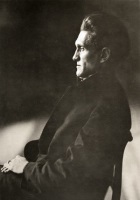Stefan Anton George
Stefan Anton George Poems
I journeyed home: such flood of blossoms never
Had welcomed me… a throbbing in the field
And in the grove there was of sleeping powers.
...
Come to the park they say is dead, and view
The shimmer of the smiling shores beyond,
The stainless clouds with unexpected blue
...
The summer field is parched with evil fire,
And from a shoreland trail of trodden clover
I saw my head in waters thick with mire
...
Komm in den totgesagten park und schau:
Der schimmer ferner lächelnder gestade,
Der reinen wolken unverhofftes blau
...
Sun with a mellower fall
Plot of your garden edges,
Slants through the house in hedges
Down through gaps in the wall.
...
Die sommerwiese dürrt von arger flamme.
Auf einem uferpfad zertretnen klees
Sah ich mein haupt umwirrt von zähem schlamme
...
Ich kam zur heimat: solch gewog von blüten
Empfing mich nie .. ein pochen war im feld
In meinem hain von schlafenden gewalten,
...
Stefan Anton George Biography
George was born in Bingen in Germany in 1868. He spent time in Paris, where he was among the writers and artists who attended the Tuesday soireés held by the poet Stéphane Mallarmé. He began to publish poetry in the 1890s, while in his twenties. George founded and edited an important literary magazine called Blätter für die Kunst. He was also at the center of an influential literary and academic circle known as the Georgekreis, which included many of the leading young writers of the day, (e.g., Friedrich Gundolf and Ludwig Klages). In addition to sharing cultural interests, the circle reflected mystical and political themes. George knew and befriended the "Bohemian Countess" of Schwabing, Fanny zu Reventlow, who sometimes satirized the circle for its melodramatic actions and views. George was identified with an extreme conservatism in politics.[citation needed] He was a homosexual, and led, and exhorted his young friends to lead, a celibate life. In 1914 at the start of the war he foretold of a sad end for Germany, and between then and 1916 wrote the pessimistic poem Der Krieg (The War). The outcome of the war saw the realization of his worst fears. In 1933 after the Nazi takeover Joseph Goebbels offered him the presidency of a new Academy for the arts, which he refused. He also stayed away from celebrations prepared for his 65th birthday. Instead he travelled to Switzerland, where he died near Locarno. After his death, his body was interred before a delegation from the National Socialist government could attend the ceremony. George's poetry is characterized by an aristocratic and remote ethos; his verse is formal in style, lyrical in tone, and often arcane in language, being influenced by Greek classical forms, in revolt against the realist trend in German literature at the time. Believing that the purpose of poetry was distance from the world—he was a strong advocate of art for art's sake —George's writing had many ties with the French Symbolist movement and he was in contact with many of its representatives, including Stéphane Mallarmé and Paul Verlaine. George was an important bridge between the 19th century and German modernism, even though he was a harsh critic of the then modern era. He experimented with various poetic metres, punctuation, obscure allusions and typography. George's "evident homosexuality" is reflected in works such as Algabal and the love poetry he devoted to a gifted adolescent of his acquaintance named Maximilian Kronberger, whom he called "Maximin", and whom he identified as a manifestation of the divine. The relevance of George's sexuality to his poetic work has been discussed by contemporary critics, such as Thomas Karlauf and Marita Keilson-Lauritz. Algabal is one of George's best remembered collections of poetry, if also one of his strangest; the title is a reference to the effete Roman emperor Elagabalus. George was also an important translator; he translated Dante, Shakespeare and Baudelaire into German.)
The Best Poem Of Stefan Anton George
Hyperion
I journeyed home: such flood of blossoms never
Had welcomed me… a throbbing in the field
And in the grove there was of sleeping powers.
I saw the river, slope and shire enthralled,
And you, my brothers, sun-heirs of the future:
Your eyes, still chase, are harboring a dream,
Once yearning thoughts in you, to blood shall alter…
My sorrow-stricken life to slumber leans,
But graciously does heaven's promise guerdon
The fervent… who may never pace the Realm.
I shall be earth, shall be the grave of heroes,
That sacred sons approach to be fulfilled.
With them the second age comes, love engendered
The world, again shall love engender it.
I spoke the spell, the circle has been woven…
Before the darkness fall, I shall be snatched
Aloft and know: through cherished fields shall wander
On weightless soles, aglow and real, the God.
